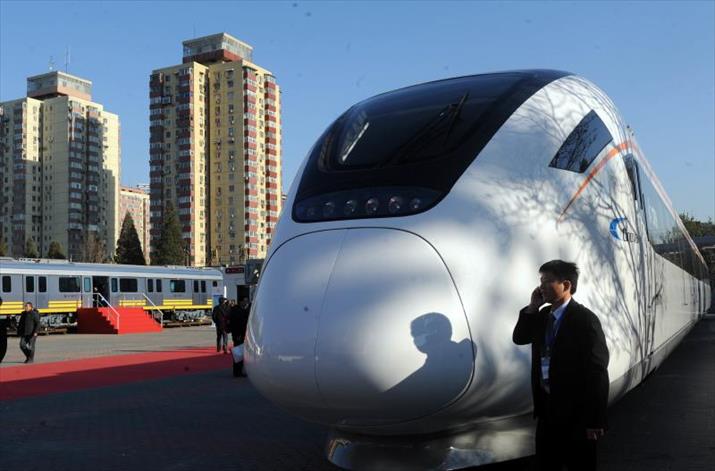FDI can now be invested in China's rail transportation industry
After a three-decade surge of impressive growth, foreign direct investment (FDI) in China has showed definite signs of slowing down. Experts observe that this can be attributed to the profound changes that have taken place in the global industrial chain along with the challenge of China losing its competitive edge in terms of labor, land and natural resources.
Statistics from the Ministry of Commerce say China utilized 813.2 billion yuan in FDI in 2016, a year-on-year increase of 4.1 percent. However, if this amount is valued in U.S. dollars, which is $126 billion, then the inbound FDI in 2016 actually dropped from $126.2 billion in 2015, because of the devaluation of the renminbi, China's currency.
To address these challenges and resuscitate FDI growth, China's State Council issued a document in late January outlining 20 measures to spur foreign investment, including loosening restrictions on foreign capitals' entry into the service, manufacturing and mining sectors. It also pledged to beef up efforts to protect intellectual property and encourage both domestic and foreign businesses to equally bid for government procurement. In addition, foreign businesses are encouraged to invest in the underdeveloped western region and revival of the northeastern provinces, China's old heavy-industry bases that are under industrial transformation.
A new playing field
The new policy has opened doors in some monopoly sectors. Overseas capital is now allowed to be invested in manufacturing industries such as rail transportation equipment, motorbikes and processing of oils and fats. Restrictions on foreign investments in extracting unconventional oils and minerals are loosened, while joint ventures to explore petroleum and gas are required to file documents for records instead of getting approval before operation.
"The inflow of foreign capital will accelerate reform in monopoly sectors by bringing foreign technologies and human resources along with capital," said Hao Hongmei, Deputy Director of Institute of Foreign Investment, Chinese Academy of International Trade and Economic Cooperation (CAITEC).
Xu Hongcai, a researcher from the China Center for International Economic Exchanges, shares Hao's sentiments. "It means foreign businesses in China will embrace a more open, fairer and more convenient business environment," he said.
According to the document, China will make greater efforts in creating an environment for fair competition. All businesses registered in China, no matter foreign or domestic, are treated equally.
With a green light given to foreign capital, Chinese companies will face fiercer competition from foreign rivals. International manufacturers like Siemens, Bombardier Transportation and ABB Group are showing intentions of enlarging market shares in China.
However, challenges also breed opportunities. Bai Ming, a researcher on international markets at CAITEC, believes lifting restrictions will help optimize resources in both domestic and global markets. "Foreign capital brings in cooperation opportunities and possibilities of optimizing domestic and global resources. It helps strengthen Chinese companies' competitiveness in the global market," he said.
In the services sectors, restrictions on foreign businesses investing in banks, sectors of security brokerages and insurance will be loosened. Accounting, architectural design and rating services will allow foreign capital to invest. Sectors such as telecommunications, Internet and education will also be gradually opened up.
Dong Dengxin, Director of Finance and Securities Institute with Wuhan University of Science and Technology, pointed out the move will accelerate globalization of domestic financial businesses and strengthen their international competitiveness. "Although China's state-owned banks are very big, their share on the global market is relatively small. Opening up in these sectors will accelerate steps of Chinese banks going abroad," said Dong, adding that foreign banks will be able to enter Chinese market.
China also introduced favorable policies for foreign businesses entering new sectors. It encourages investment in high-end, green and intelligent manufacturing to beef up the nation's efforts in realizing Made in China 2025 strategy, support foreign businesses to bid for infrastructure projects via franchise and establish research centers or cooperate with domestic research institutes.
Attraction remaining
The World Investment Report 2016 released by the United Nations Conference on Trade and Development shows that globally, China remains the second most attractive destination for FDI. Its booming services sector, high-end manufacturing, innovation sector and its western region are showing lucrative prospects.
According to China's National Bureau of Statistics, consumption contributed 64.6 percent to China's economic growth in 2016. The output of the services sector totaled 38.4 trillion yuan ($5.6 trillion), making up 51.6 percent of the total GDP.
Despite the slow growth of inbound FDI in other sectors, foreign capital is sensitive to the booming services sector in China. In 2016, FDI in China's services sector accounted for 70.3 percent of the total FDI in all sectors, reaching 571.58 billion yuan ($83.2 billion), a year-on-year increase of 8.3 percent.
"Foreign capital is attracted by the lucrative potential of China's services sector. With the country upgrading its economic structure, the momentum for the growth of the services sector will remain robust in the future, especially modern services sectors involving technology and information," said Li Dawei, a researcher from Academy of Macroeconomic Research with China's National Development and Reform Commission. He is confident that more foreign businesses will invest in this sector as China improves its business environment and loosens restrictions on the entry of foreign capital.
With the Belt and Road Initiative, infrastructure and connectivity in China's western region are improving. "The huge untapped market potential in the western region of China will be a sustained impetus for foreign businesses," said Hao.
Experts believe opportunities produced by urbanization are also attractions. "Promoting urbanization will create an even greater market, of which foreign businesses can have a share," said Li.
According to Li, to increase the attraction, cities in the western region should work together and cultivate powerful industries that can promote the emergence of supporting industries as well as economic progress of the region as a whole. "A better and fairer business environment supported by favorable policies and improved infrastructure is also needed," said Li.
